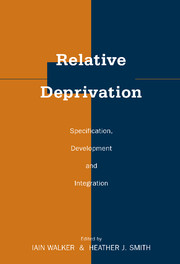Book contents
- Frontmatter
- Contents
- List of Contributors
- 1 Fifty Years of Relative Deprivation Research
- PART ONE SPECIFICATION
- PART TWO DEVELOPMENT
- PART THREE INTEGRATION
- 11 Social Identity and Relative Deprivation
- 12 Relative Deprivation and Counterfactual Thinking
- 13 Relative Deprivation and Attribution: From Grievance to Action
- 14 Spontaneous Temporal and Social Comparisons in Children's Conflict Narratives
- 15 Prejudice as Intergroup Emotion: Integrating Relative Deprivation and Social Comparison Explanations of Prejudice
- Part Four Conclusion
- Index
13 - Relative Deprivation and Attribution: From Grievance to Action
Published online by Cambridge University Press: 29 September 2009
- Frontmatter
- Contents
- List of Contributors
- 1 Fifty Years of Relative Deprivation Research
- PART ONE SPECIFICATION
- PART TWO DEVELOPMENT
- PART THREE INTEGRATION
- 11 Social Identity and Relative Deprivation
- 12 Relative Deprivation and Counterfactual Thinking
- 13 Relative Deprivation and Attribution: From Grievance to Action
- 14 Spontaneous Temporal and Social Comparisons in Children's Conflict Narratives
- 15 Prejudice as Intergroup Emotion: Integrating Relative Deprivation and Social Comparison Explanations of Prejudice
- Part Four Conclusion
- Index
Summary
Relative deprivation theory belongs to a family of social evaluation theories (Pettigrew, 1967) that have as their common bond a focus on the social comparative nature of social judgments. The core of the relative deprivation (RD) construct is that when people's expectations about the goods and conditions of life to which they believe they are entitled are thwarted, they become angry and are motivated to redress the perceived inequity. Judgments about entitlements can only be made relatively – people compare their current or anticipated outcomes with those of other individuals or groups. Unfortunately, as with most members of the family of social evaluation theories, when RD theory has been applied to major social issues, it has typically been in a post hoc manner. As a theory, it will only mature if it lends itself to prediction, rather than retrospection. This point has been made for several decades now.
One reason why RD theory has been applied retrospectively more than prospectively is the relative absence of testable models linking the perception of deprivation, through various mediators, to behavioral outcomes. In this chapter we attempt to specify such a model. The model we suggest integrates Folger's Referent Cognition Theory (RCT) of RD (Folger, 1984, 1986, 1987; Mark & Folger, 1984) and Weiner's version of attribution theory (1985, 1986, 1995). We begin by describing RCT, and claim that it is a general, useful, and parsimonious model of RD.
- Type
- Chapter
- Information
- Relative DeprivationSpecification, Development, and Integration, pp. 288 - 312Publisher: Cambridge University PressPrint publication year: 2001
- 5
- Cited by



